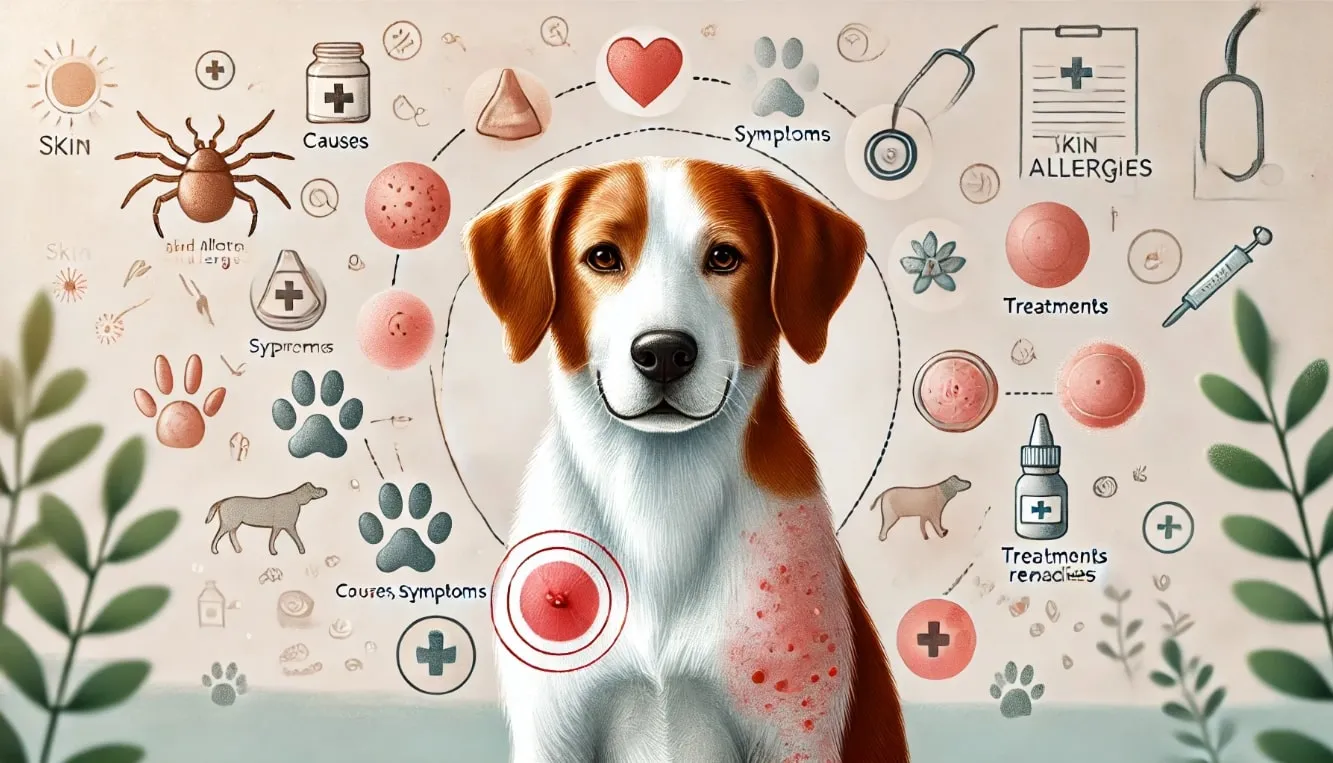Skin Allergies in Dogs

Skin allergies are a common issue among dogs and can cause significant discomfort. Understanding the causes, symptoms, and treatments for skin allergies can help you manage your dog’s condition effectively.
Importance of Gut Health
Gut health plays a crucial role in managing skin allergies in dogs. A healthy gut helps to maintain a strong immune system, which can reduce the severity and frequency of allergic reactions. Imbalances in gut bacteria can lead to inflammation and exacerbate skin conditions.
How Gut Health Affects Skin Allergies
- Immune Function: A significant portion of a dog’s immune system resides in the gut. A healthy gut supports a balanced immune response, reducing allergic reactions.
- Inflammation Control: Good gut health helps control inflammation throughout the body, including the skin.
- Nutrient Absorption: Proper gut function ensures that your dog absorbs essential nutrients that support skin health.
- Impact of Diet Rich in Carbs and Fruits: Diets high in carbohydrates or rich in fructose from fruits can negatively affect gut health by causing imbalances in the gut microbiome. These imbalances can lead to inflammation, which may worsen skin issues and even compromise the immune system. Excess sugar in the diet can disrupt gut bacteria, leading to digestive problems, which in turn can trigger or aggravate skin allergies.
Improving Gut Health
- Dietary Changes: Switching to a diet rich in prebiotics and probiotics can help restore gut balance.
- Pro Belly: Pro Belly is a high-quality probiotic supplement designed specifically for dogs. It promotes a healthy gut microbiome, supports immune function, and can significantly reduce skin allergies. Adding Pro Belly to your dog’s daily diet can make a noticeable difference in their overall health and skin condition.
Fasting and Intermittent Fasting
Fasting and intermittent fasting, under the supervision of a veterinarian, can be beneficial for dogs with skin allergies. These practices can help reset the gut and reduce inflammation.
Benefits of Fasting
- Detoxification: Fasting allows the body to eliminate toxins, which can reduce allergic reactions.
- Gut Rest: Giving the digestive system a break can help heal the gut lining and improve overall gut health.
- Reduced Inflammation: Intermittent fasting can lower inflammation levels, which may alleviate skin symptoms.
Implementing Fasting
- Supervision: Always consult with a veterinarian before starting a fasting regimen to ensure it is safe and appropriate for your dog.
- Gradual Introduction: Start with short fasting periods and gradually increase the duration as recommended by your vet.
Causes of Skin Allergies
Skin allergies in dogs can be caused by a variety of factors, including:
- Environmental Allergens: Pollen, dust mites, mold, and other environmental factors can trigger allergic reactions.
- Food Allergies: Certain ingredients in dog food, such as beef, chicken, dairy, or wheat, can cause allergies.
- Flea Allergies: Flea bites can cause an allergic reaction in some dogs, leading to intense itching and scratching.
- Contact Allergens: Substances like shampoos, soaps, or chemicals that come into contact with your dog’s skin can cause allergies.
Symptoms of Skin Allergies
The symptoms of skin allergies in dogs can vary but often include:
- Itching and Scratching: Persistent itching and scratching, especially around the face, ears, and feet.
- Red, Inflamed Skin: Areas of the skin may become red, inflamed, and sore.
- Hair Loss: Excessive scratching and biting can lead to patches of hair loss.
- Hot Spots: Red, moist, and irritated areas of skin, often caused by excessive licking or scratching.
- Ear Infections: Recurrent ear infections may be a sign of an underlying allergy.
Diagnosing Skin Allergies
Diagnosing skin allergies in dogs typically involves:
- Veterinary Examination: A thorough examination by your vet to rule out other causes of skin issues.
- Allergy Testing: Blood tests or intradermal skin tests to identify specific allergens.
- Dietary Trials: An elimination diet to determine if a food allergy is present.
Treatment and Management
Managing skin allergies in dogs often requires a multi-faceted approach, including:
- Improving Gut Health: Using probiotics like Pro Belly and considering dietary changes to support gut health.
- Avoiding Allergens: Identify and minimize exposure to the allergens causing the reaction.
- Medications: Antihistamines, corticosteroids, or immunotherapy may be prescribed by your vet to manage symptoms.
- Flea Control: Implement a comprehensive flea control program to prevent flea allergies.
- Dietary Management: Switch to a hypoallergenic diet if a food allergy is identified.
- Topical Treatments: Use medicated shampoos, ointments, or sprays to soothe and treat the affected skin.
- Fasting and Intermittent Fasting: Implement fasting routines under vet supervision to help reset and heal the gut.
Preventive Measures
To help prevent skin allergies in your dog:
- Regular Grooming: Keep your dog’s coat clean and free of allergens.
- Healthy Diet: Feed your dog a balanced and high-quality diet, including probiotics like Pro Belly, to support overall skin health.
- Flea Prevention: Use flea preventatives regularly to avoid flea-related allergies.
- Avoid Harsh Chemicals: Use gentle, hypoallergenic grooming products and avoid exposure to harsh chemicals.
For more information or support, join our Pack Platform to connect with other dog parents and experts.